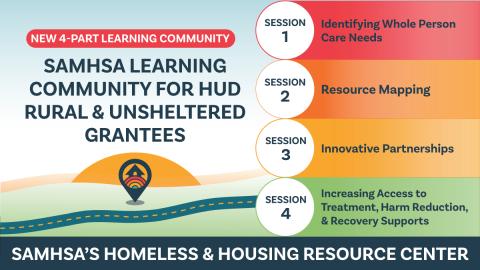Knowledge & Resources
Search and download a library of information and resources for health professionals and housing specialists.
Featured Article

This Learning Community for HUD Rural and Unsheltered grantees will focus on supporting Continuums of Care (CoCs) in understanding and building cross-system partnerships that address the needs of individuals and families impacted by substance use and/or mental disorders among those experiencing unsheltered homelessness and homelessness in rural areas.
Read MoreExplore The Resources
Filter
Clear AllResults
-
Toolkit Whole-Person Care for People Experiencing Homelessness and Opioid Use Disorder: Toolkit Part 2
This guide focuses on understanding the neurobiology of opioid use disorder (OUD) and the treatment and recovery pathways for OUD. The guide covers best practices for referrals and warm handoffs, as well as assistance in meeting basic needs such as income, food, and mainstream benefits.
Article Learning Community: Trauma-Informed Outreach and Engagement
In this four-part series, attendees will learn the fundamentals of providing Trauma-Informed Care (TIC) from the lens of working to engage and provide services for people with behavioral health needs who are also experiencing homelessness.
-
Toolkit Guide to Methamphetamine Use, Treatment, and Housing Considerations for People Experiencing Homelessness
This guide explores how service providers can better support people who use methamphetamine in the process of transitioning into and maintaining housing.
-
Toolkit Effective Property Management Engagement Strategies
This issue brief covers identifying service providers’ strengths and resources that will appeal to property management, developing an agency “pitch," identifying existing rental industry networks or initiating a network where none exists, and formalizing the property management-provider partnership.
Article Learning Community: Supportive Housing Models that Work
In this three-part series, attendees will learn innovative ways to center equity and the perspective of those with lived experience to support individuals experiencing homelessness with behavioral health needs in securing and sustaining affordable housing and supportive services that meet their needs and preferences.